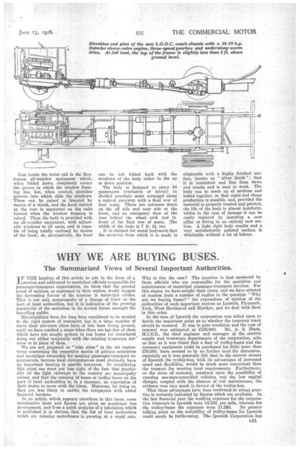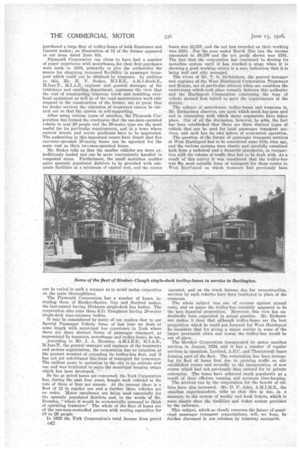• WHY WE ARE BUYING BUSES.
Page 23

Page 24

If you've noticed an error in this article please click here to report it so we can fix it.
The Summarized Views of Several Important Authorities.
IF THE heading of this article be ptit lathe form of a question and addressed to municipal officials responsible for passenger-transport organization; we think that the general trend of opinion, as expressed in their replies, would suggest the decreasing favour of the tramcar in municipal circles. This is not only symptomatic of a change of front on the part of local authorities, but it is indicative of the growing popularity of the motorbus in its several forms amongst the travelling public.
Municipalities have for long been considered to be wedded to the rigid system of transport, but in a large number of cases their pro-tram ideas have of late been losing ground, until we have reached a stage when there are but few of them which have not sought powers to run buses (or considered doing so) either conjointly with the existing tramways ser-. vices or in place of them.
We are not prepared to "take sides" in the old controversy concerning the respective merits of private enterprise and municipal ownership for meeting passenger-transport requirements, because local circumstances must obviously have an important bearing in specific instances. In considering this point one must not lose sight of the fact that practically all the light railways in the country are municipallyowned, and that the running of buses or trolley-buses on the part of local authorities is, in a measure, an expression of their desire to move with the times. Moreover, by doing so, they are less likely to saddle the ratepayers with added financial burdens.
In an article which appears elsewhere in this issue, some informative facts and figures are given on municipal bus development, and from a quick analysis of a tabulation which is published it is obvious that the list of local authorities which are running motorbuses is growing at a rapid rate.
Why is this the case? The question is best answered by those officials who are responsible for the operation and maintenance of municipal passenger-transport services. For this reason we have sought their views, and we have selected at random from a number of replies to the question "Why are we buying buses?" the expressions of opinion of the authorities of such important centres as Ipswich, Plymouth, York, West Hartlepool and Merthyr, and we deal with them in this order.
In the case of Ipswich the corporation was called upon to decide the important point as to whether the tramway track should be renewed. It was in poor condition and the cost of renewal was estimated at 1156,000. Mr, A. S. Black, the chief engineer and manager of the electric supply and tramways departments of the corporation, tells us that as it was found that a fleet of trolley-buses and the necessary equipment could be purchased for little more than 170,000, there seemed to be no further need for discussion, especially as it was generally felt that in the narrow streets of Ipswich the trolley-bus, with its advantages of increased speed and flexibility, would be much more convenient than the tramcar for meeting local requirements. Furthermore, on the score of economy, resultant upon the possibility of running one-man-controlled vehicles, and the low capital charges, coupled with the absence of rail maintenance, the evidence was very much in favour of the trolley-bus.
That these advantages have been confirmed in actual practice is certainly indicated by figures which are available. In the last financial year the working expenses for the corporation tramcars in Ipswich were 14.12d. per mile, whereas for the trolley-buses the expenses were 11.29d. No greater talking point on the suitability of trolley-buses for Ipswich could surely be forthcoming. The Ipswich Corporation has C41 purchased a large fleet of trolley-buses of both Ransomes and Garrett makes; an illustration of 15 of the former appeared in our issue dated June 8th.
Plymouth Corporation can claim to have had a number of years' experience with motorbuses, for their first purchases were made in 1919, primarily to give the authorities the means for obtaining increased flexibility in passenger transport which• could not be obtained by tramcars. • In addition to. this, Mr. H. P. Stokes, M.I.E.E., M.Inst.T., M.I.A.E, engineer and general manager of the tramways and omnibus department, expresses the view that the cost of constructing tramway track and installing overhead equipment as well as of the road maintenance work subs sequent to the construction of the former, are so great that for -feeder services the extension of tramways cannot be carried out so that the system is self-supporting.
After using various types of omnibus, the Plymouth Corporation has formed the conclusion that the one-man-operated vehicle to seat 20 people and the 20-seater type are the most useful for its particular requirements, and in a town where narrow streets and severe gradients have to be negotiated; The authorities in this important centre have found that five oneman-operated 20-seater buses can be operated for the ssime cost as three two-men-operated buses.
Mr. Stokes tells us that the smaller vehicles are more expeditiously loaded and can be more conveniently handled in congested areas. Furthermore, the small motorbus enables quite sparselypopulated districts to be provided with adequate facilities at a minimum of capital cost, and the routes
can be varied in such a manner as to avoid undue congestion on the main thoroughfares.
The Plymouth Corporation has a number of buses, including the of Straker-Squire, Guy and Burford makes, the last-named having Hickman single-deck bus bodies. The corporation also runs three S.D. Freighters baying 20-seater single-deck rear-entrance bodies.
It may be remembered by many of our readers that in our Special Passenger Vehicle Issue of last year we dealt at some length with municipal bus experience in York where there are three distinct forms of passenger transport, as represented by tramcars, motorbuses and trolley-buses, in use.
According to Mr: J. A. Bromley, A.M.I.E.E., M.I.A.E., M.Inst.T., the general manager and engineer of the tramways and motors organisation, the corporation has no intention at the present moment of extending its trolley-bus fleet, and it has not yet sub dituted this form of transport for tramways. The railless route in operation in the city is an entirely new one and was instituted to serve the municipal housing estate which has been developed. • So far as petrol buses are concerned, the York Corporation has, during the past four years, bought such vehicleg at the rate of three or four per annum. At the present there is a fleet of 12 in regular use and a further three vehicles are on order. Motor omnibuses are being used essentially for the sparsely populated districts and, in the words of Mr. Bromley, "where it would be economically unsound to think of operating tramcars." The whole of the fleet of buses are of the one-man-controlled pattern with seating capacities for IS to 26 people.
In 1022 the York Corporation's total income from petrol c42 buses was £2,837, and the net loss recorded on their working was 1823. For the year ended March 31st last the income amounted to 19,376 and the net profit shown was P781. The fact that the corporation has continued to develop its motorbus system until it has reached a stage when it is showing a good working return is a sure indication that it is being well and ably managed.
The views of Mr. T. 0. Richardson, the general manager and engineer of the West Hartlepool Corporation Tramways and Motors, are of particular interest when one considers the controversy which took place recently between this authority and the Hartlepool Corporation concerning the type of vehicle deemed best suited to meet the requirements of the district.
The subject of motorbuses, trolley-buses and tramcars is, Mr. Richardson observes, one upon which much has been said and in connection with which many arguments have taken place. Out of all the discussion, however, he adds, the fact has been established that there are three distinct types of vehicle that can be used for local passenger transport services, and each has its own sphere of economies.] operation.
The question of the future of passenger transport services at West Hartlepool. had to be considered some little time ago, and the various systems were closely and carefully examined both from a technical and a financial standpoint, in conjunction with the volume of traffic that had to be dealt with. As a result of this survey It was considered that the trolley-bus was the most suitable form of transport for those routes in West Hartlepool on which tramcars had previously been operated, and as the track became due for reconstruction, services by such vehicles have been instituted in place of the tramcars.
The whole subject was one of revenue against annual costs, and on paper the trolley-bus certainly appeared to be the best financial proposition. Moreover, this view has undoubtedly been supported in actual practice. Mr. Richardson makes it clear that although trolley-buses are the best proposition which he could: put forward for West Hartlepool he Considers that for giving a major service in some of the larger provincial cities and towns the trolley-bus would be out of place.
The Merthyr Corporation inaugurated its motor omnibus services in August, 1924, and it has a number of regular services in operation, Leyland, A.E.C. and Thornycroft buses forming part of the fleet. The corporation has been increasing its fleet of buses first due to growing traffic on oldestablished routes and secondly to the inauguration of new routes which had not previously been catered for by private enterprise.. The buses have achieved much popularity as a result of their efficient running and accurate time-keeping.
The services run by the corporation for the benefit of colliers have also increased. Mr. P. F..A4ey, A.M.I.M.E., the omnibus superintendent, tells us that this is due, in a measure, to the system of weekly end book tickets, which is more .elastic than the facilities and ticket system provided by the railways.
This subject, which so closely concerns the future of municipal passenger transport organisations, will, we hope, be further discussed in our columns by tramway managers.




















































